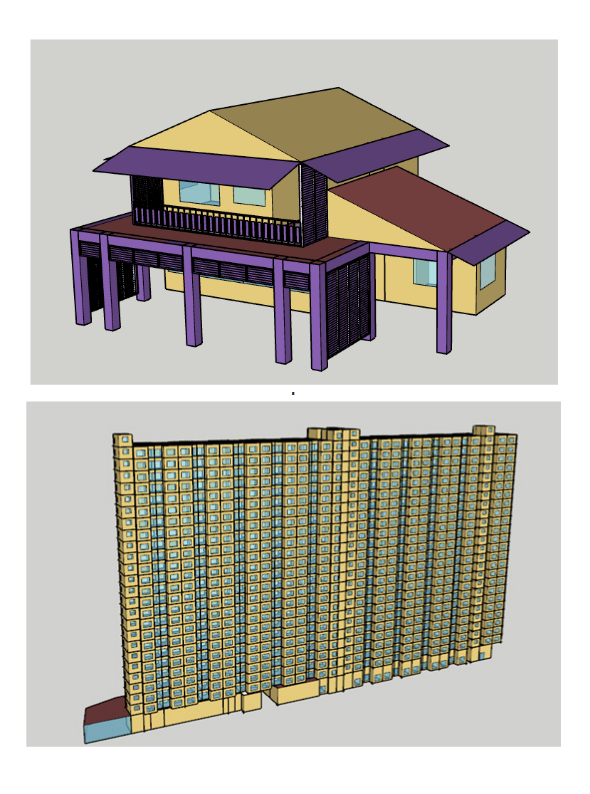Energy-Saving and Environmentally-Friendly Residential Drawings Certification and Labelling Rating Systems using Energy Simulation and Life Cycle Assessment
Main Article Content
Abstract
There were approximately 25 million houses in Thailand. The residential unit’s increase rate is 0.5-0.6 million units each year. The majority of the type of housings are detached houses and this is applied to every part of the country. Residential buildings in Thailand consume almost 50% of the total electricity used in the building sector. Residential building has a high impact on the environment because it releases a high amount of greenhouse gases from material production, building construction, building utilization, and building demolition. The sustainable house plan rating and labeling system is one of the measures that could minimize environmental impacts of new residential buildings. The development of sustainable house plan rating and labeling system began with the surveying green residential building rating systems both in Thailand and from other countries. Main credit categories and points allocation were then identified. Residential base cases were selected and were applied with various sustainable design options and analyzed in terms of energy-saving, additional investment, life cycle costing (LCC), and life cycle analysis (LCA). Design options associate with better energy-saving and better LCA were selected as prerequisite credits and point credits. Implementation of a home energy-saving and environmentally friendly certification system would be an important mechanism in driving the design of houses that are energy-efficient and environmentally friendly throughout the life cycle, which help to promote sustainable development according to the Sustainable Development Goal (SDG) no 11, 12, and 13. The rating system could assist the home buyer’s decision-making in selecting appropriate sustainable housing projects.
Downloads
Article Details

This work is licensed under a Creative Commons Attribution-NonCommercial-NoDerivatives 4.0 International License.
All material is licensed under the terms of the Creative Commons Attribution 4.0 International (CC-BY-NC-ND 4.0) License, unless otherwise stated. As such, authors are free to share, copy, and redistribute the material in any medium or format. The authors must give appropriate credit, provide a link to the license, and indicate if changes were made. The authors may do so in any reasonable manner, but not in any way that suggests the licensor endorses you or your use. The authors may not use the material for commercial purposes. If the authors remix, transform, or build upon the material, they may not distribute the modified material, unless permission is obtained from JARS. Final, accepted versions of the paper may be posted on third party repositories, provided appropriate acknowledgement to the original source is clearly noted.
References
Agency For Real Estate Affairs Co., Ltd. (2018). Bangkok Metropolitan Area Housing Market Report 2017.
Chanikarn Yimphayoon. (2008). Comparative life cycle assessment between steel structure residential buildings and concrete structures in Thailand. 4th Energy Network of Thailand Conference, Rose Garden Riverside Hotel Suan Sampran, Nakhon Pathom.
Citherlet, S., & Defaux, T. (2007). Energy and environmental comparison of three variants of a family house during its whole life span. Building and Environment, 42(2), 591-598. doi:https://doi.org/10.1016/j.buildenv.2005.09.025
Cuéllar-Franca, R. M., & Azapagic, A. (2012). Environmental impacts of the UK residential sector: Life cycle assessment of houses. Building and Environment, 54, 86-99. doi:http://dx.doi.org/10.1016/j.buildenv.2012.02.005
Dahlstrøm, O., Sørnes, K., Eriksen, S. T., & Hertwich, E. G. (2012). Life cycle assessment of a single-family residence built to either conventional- or passive house standard. Energy and Buildings, 54, 470-479. doi:http://dx.doi.org/10.1016/j.enbuild.2012.07.029
Department of Alternative Energy Development and Efficiency. (2017). Study projects to set energy efficiency benchmarks for residential homes. Bangkok: Department of Alternative Energy Development and Efficiency.
Energy Policy and Planning Office. (2017). Energy overview. Retrieved from http://www.eppo.go.th/index.php/en/
International Standard Organization. (2006). ISO 14040 Environmental Management - Life Cycle Assessment - Principles and Framework.
National Statistics Office. (2018). Key statistics. Retrieved from http://statbbi.nso.go.th/staticreport/page/sector/th/index.aspx
Thai Appraisal and Estate Agents Foundation. (2018). Building Appraisal Price B.E. 2017. Retrieved from http://www.thaiappraisal.org/thai/value/value.php
Thai Green Building Institute. Project - Thai Green Building Institute. Retrieved from https://tgbi.or.th/directory/project/
USGBC. (2019). Projects I U.S. Green Building Council. Retrieved from https://www.usgbc.org/projects
World Green Building Council. (2019). Green building & the Sustainable Development Goals. Retrieved from https://www.worldgbc.org/green-building-sustainable-development-goals.


